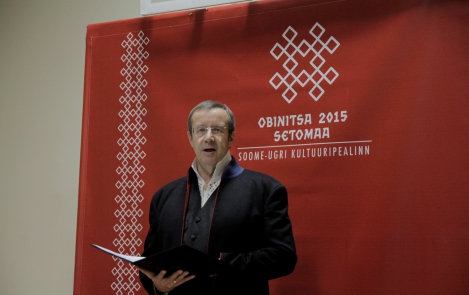-
Reset
+

President of the Republic at the Opening of the Finno-Ugric Capital of Culture in Obinitsa on 7 January 2015
07.01.2015
Dear friends,
Let me start by wishing you all a Merry Christmas!
I'm glad that Obinitsa, an old Seto village at the edge of Estonia, is the new Finno-Ugric capital of culture. Setomaa is a place with great spirit at the edge of two worlds.
The dedication and tenacity of our Setos are like a guide that teaches us all how to preserve our unique culture, even in times of difficulty and inevitable change.
Maintaining one's uniqueness, such as leelo, the old Seto polyphonic singing tradition that has been entered in the UNESCO Cultural heritage List, keeps the entire world richer.
Here, at the edge of two worlds, we can see how people can use modern possibilities for the benefit of their heritage, so that their cultural and linguistic uniqueness is heard loudly and clearly, which also supports the economic development of the region and speaks to people from many different places.
All this helps the Seto cause – our common Finno-Ugric cause – to persist and grow.
This is exactly how we should be thinking about the common cause of the Finno-Ugric people. We must do more than collect and record if we want Finno-Ugric languages and cultures to continue their existence. In order to make it possible for the various Finno-Ugric peoples to survive as Finno-Ugric, we must find a way to promote our languages and cultures whilst keeping up with the times, and think how we could reach more people and get young people involved. Although the world has become smaller, we must not allow it to become poorer in terms of culture.
So, what can we do to make sure we don't disappear? What can we do better to make our heritage keep up with the times and involve more people, which is the only way to promote small cultures? We are the only ones who can do something about this. Or more specifically – you are the doers and the decision-makers, and democratic countries are your partners and allies.
In last autumn a quarter of a century passed from the fall of the Berlin Wall, and when we take a look at what has changed for the Finno-Ugric people of the world since then, we see very different images.
Estonia is an independent country again and the Hungarians have freed themselves from the shackles of communism.
Estonian, Finnish and Hungarian are among the official languages of the European Union. The Sami have their own active parliaments in Norway, Sweden and Finland. The Livonian language and culture are being restored in Latvia. World congresses of Finno-Ugric peoples are being held.
But on the other hand... The last native speaker of the Kamassian language died in 1989.
The construction of the Ust-Luga port on the coast of the Gulf of Finland in south-western Russia is destroying Votian villages and I can only hope that it won't destroy the people as well. In recent years, giving Finno-Ugric people education in their own languages has been terminated or restricted in Russia, which accelerates their assimilation and the disappearance of their culture.
This is a very clear illustration of the difference between the free world and the authoritarian world. Free and democratic societies understand that it's necessary to support the various projects aimed at the preservation of small and unique cultures and they're not afraid to do it. I am referring to projects that are significant in their content, not format. This is why it's our duty to stand for freedom and democracy both in our own society and on a broader scale to ensure that the languages and cultures of all small nations will survive.
If someone now said that there were places where the situation was rather hopeless, I'd have to admit that it was true. But hope is something we can give each other by working together and supporting each other.
The symbol of the Finno-Ugric capital of culture – a bird known as a tsirk – has arrived in Obinitsa, so let's allow its song to be heard everywhere.
Thank you.


